William Burt Pope Collection (5 vols.)
Digital Logos Edition
Overview
This nineteenth-century English Methodist thinker’s work provides extensive insight into the Wesleyan Methodist Church, and his Compendium of Christian Theology has been heralded as the most influential Methodist systematic theology of its time. Now, with this new collection, this great theologian’s sermons and writings are at your fingertips.
With Logos Bible Software, Scripture passages appear on mouseover, and all cross-references link to the other resources in your digital library, making this collection powerful and easy to access—a rich supplement to any study of the Wesleyan Methodist Church or Arminianism. Perform comprehensive searches by topic or Scripture reference—finding, for instance, every mention of “John Wesley” or “theology”—and get the most out of Pope’s writings and sermons.

Key Features
- Pope’s Arminian catechism
- A historical, dogmatic, and spiritual approach to the person of Christ
- A series of sermons and lectures delivered by Pope
Product Details
- Title: William Burt Pope Collection
- Volumes: 5
- Pages: 1,394
Individual Titles
- A Higher Catechism of Theology by William Burt Pope
- The Person of Christ: Dogmatic, Scriptural, Historical by William Burt Pope
- The Inward Witness and Other Discourses by William Burt Pope
- The Prayers of St. Paul: Being an Analysis and Exposition of the Devotional Portion of the Apostle’s Writings by William Burt Pope
- Memoir of the Late James Heald by William Burt Pope
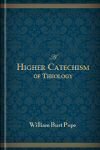
William Burt Pope provides a comprehensive Arminian catechism, clearly outlining the Wesleyan tenets of faith. He condenses his systematic theology into 300 pages of questions and answers that cause readers to take stock of their beliefs and the reasoning behind them.
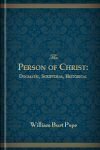
William Burt Pope’s analysis of the person of Christ is an exacting study on the doctrines associated with the Son of God. His comprehensive work examines the scriptural and historical developments of the doctrine and dogma of Jesus Christ, bringing to light the influences of religious movements on the idea and perception of who Christ is. This all-encompassing study provides insight into different theological views and approaches to the person of Christ and the tenets established by those views.
This is a strong book. The author has grappled with the question of the hypostatic union of the Divine and human natures in the one person of the God-man with unusual force of argument and power of exposition.
— British Quarterly Review
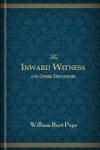
This series of discourses by William Burt Pope flows out of the idea of Christ’s indwelling presence and the impact of that presence as the fundamental truth of the Christian life. Delivered on important occasions, these compiled sermons and lectures offer a glimpse into Pope’s rhetorical style and the depth of his teaching and orator—a clear view of his doctrinal stances on Christ’s person and work in the believer’s life.
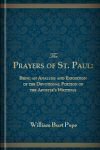
William Burt Pope takes on the underserved and often overlooked prayers of St. Paul, providing a close reading of the text in order to analyze the apostle’s petitions in an original and groundbreaking exposition. Applying the most rigid methods of modern exegesis to these devotional subjects, he presents a fresh look at the words of this Early Church Father, breaking them down in an incisive study. A beneficial study for scholar and layperson alike.
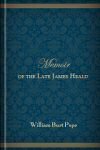
Known as one of the most influential men in Methodism, James Heald was an active philanthropist and preacher who donated substantially to Methodist institutions and overseas missions. In this memoir, William Burt Pope provides a history of Heald’s life based on accounts from family, friends, and acquaintances, inducting the late philanthropist into memorium.
About William Burt Pope
William Burt Pope (1822–1903) was a nineteenth-century Methodist theologian and scholar. He studied theology at Richmond College before becoming a Methodist minister in 1841. In 1867, he was appointed professor of systematic theology at Didsbury College in Manchester, where he lectured and wrote prolifically. In 1877, he became president of the British Wesleyan Conference. His Compendium of Christian Theology is the most influential Methodist systematic theology of its time.